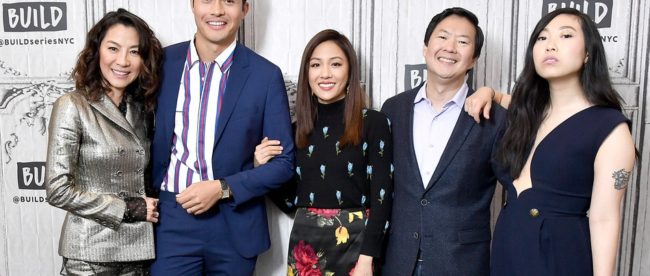Going Crazy, Getting Rich, and Being Asian
A culture article by Ananya Hindocha and Sonia Pramanick
1993.
America had just elected Bill Clinton. The Waco siege was plastered all over the news. And The Joy Luck Club was released over the summer. This was the last time Americans had gotten the chance to watch a majority Asian cast on the big screen. It was partly due to this surprisingly extensive break that Crazy Rich Asians made headlines when it was released this past summer.

(IMDb.com)
Crazy Rich Asians tells the story of an economics professor, Rachel Chu, and her Singaporean hot-shot boyfriend, Nick Young–and how their lives are turned upside down when they visit Nick’s ancestral home. Rachel soon realizes that her boyfriend is the famous Nick Young, known as the most eligible bachelor of Singapore and heir to one of the largest fortunes in the region. In no time, it seems that everyone is out to get Rachel: Nick’s mother and every local girl with enough plastic surgery and designer handbags to last a lifetime. But, of course, every romantic comedy must have a happy ending, and when it seems like Rachel has had enough, Nick gets down on one knee and offers to disown his family and fortune all for her. The final scene ends with a tear worthy proposal and Rachel saying “yes!”
Crazy Rich Asians is not only a favorite among fans for its content but also for its social impact. The movie was the first of its kind in 25 years to employ a 100% Asian cast, bringing much needed change to Hollywood’s casting methodology.

(Michael Loccisano/Getty Images)
With an Asian American population of over 15 million in the United States, it’s a surprise that Hollywood hasn’t funded an all-Asian cast for so long. Nevertheless, Crazy Rich Asians has shown that these movies certainly pay. The film, originally a novel by author Kevin Kwan, earned $26 million domestically in its opening weekend and doubled that within a week. It has also been a major success worldwide grossing an approximate $187 million dollars. With the success of other films that featured diverse casts such as Black Panther, Searching, and even the Netflix phenomenon To All the Boys I’ve Loved Before, Hollywood is finally realizing that diversity sells. The economic success of Crazy Rich Asians may be a game changer for the industry. In fact, there have been rumors that other majority Asian films are in the production process, including a sequel to Crazy Rich Asians.
On top of profit, Crazy Rich Asians did something monumental in terms of representation. The movie put Asian actors playing Asian roles on the big screen. This movie was almost entirely made for this purpose. The director and author had a very lucrative deal from Netflix presented to them but they rejected it so that an Asian American cast could finally be on the big screen after a quarter of a century.
Some Asian Americans grew up without having seen a single movie made by Hollywood with people who looked like them. Instead, they had white actors like Scarlett Johansson (who took a role arguably meant for an Asian actress in Ghost in the Shell) tell their stories. Interviews with the cast members of Crazy Rich Asians shows how meaningful it was to finally portray Asians as more than stereotypes. Research has shown that representation in the media matters. People who aren’t represented tend to do something called “symbolic annihilation” which is when a person is convinced they’re not important because there are no figures in the media that look like them.
Another study illustrates how representation on TV has an effect on the self esteem of young kids. Crazy Rich Asians took a step towards having good representation of east Asians on the big screen. Hopefully, it opens the door to many other Asian films.
Besides being based on a New York Times bestselling trilogy of books, Crazy Rich Asians brought a message of social change to the big screen. For the past 25 years, Hollywood hasn’t released any films starring an all-Asian cast, turning the Crazy Rich Asians franchise into a social movement. This movie has beaten the odds and Hollywood has certainly heard the message loud and clear: diversity pays.
[Sources: www.huffingtonpost.com, boxofficemojo.com]

